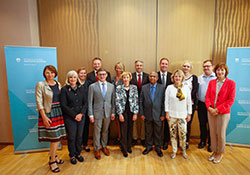Slovenia is prepared to respond to health emergencies

WHO
Slovenia is the third country of the European Union (after Finland and Belgium) to undergo an independent evaluation of its capacity to ensure people are protected from health threats during emergencies. Using WHO’s Joint External Evaluation (JEE) tool, WHO and external experts joined national specialists for a week-long mission in June 2017 to review the status of the country’s International Health Regulation (IHR) core capacities.
Main results of Slovenia’s JEE
- The JEE determined that Slovenia has a strong public health system that is well integrated into national health-care infrastructure and coordinated with the national programme for emergency preparedness and response. Health emergency prevention, preparedness and response are supported by legislation and policy.
- Despite the country’s strong overarching emergency management structure, day-to-day activities and emergency response actions need strengthening through an all-hazards approach. Better alignment of plans and procedures from various sectors, including for risk communication, is needed.
- Human and animal laboratory diagnosis and surveillance activities are sophisticated and available across the country; improved multisectoral coordination and use of modern electronic platforms for data collection and analysis would further enhance early detection of outbreaks.
- Human resources are generally employed efficiently to safeguard health security; however, a coordinated assessment of current capacity is needed to identify mechanisms to ensure an adequate number of health professionals to meet Slovenia’s needs. One specific recommendation in this area is to establish a permanent office on health security policy and planning within the Ministry of Health, with the ability to collaborate across the Government prior to and during a health emergency.
Slovenia’s implementation of the JEE’s recommendations will start in autumn 2017. WHO/Europe will support the country’s development of an all-hazards emergency plan and will organize risk communication training for selected media and health experts.
About the JEE
WHO introduced the JEE tool in 2016 within the framework of IHR monitoring and evaluation. Its objective is to evaluate capabilities in 19 technical areas in order to describe the status of IHR implementation in a country and to inform progress on building capacities for health security. The JEE is a peer-to-peer review conducted collaboratively by experts from the host country and external evaluation team members appointed by WHO. Together they submit to country authorities a joint report on findings and recommendations on priority areas for action.



